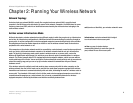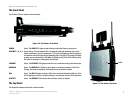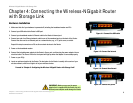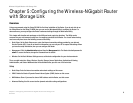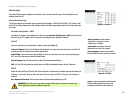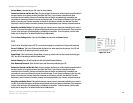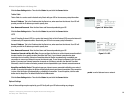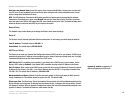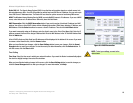
12
Chapter 5: Configuring the Wireless-N Gigabit Router with Storage Link
The Setup Tab - Basic Setup
Wireless-N Gigabit Router with Storage Link
Internet Setup
The Internet Setup section configures the Router for your Internet connection type. This information can be
obtained from your ISP.
Internet Connection Type
The Router supports six connection types: Automatic Configuration - DHCP, Static IP, PPPoE, PPTP, Telstra Cable,
and L2TP. Each Basic Setup screen and available features will differ depending on what kind of connection type
you select.
Automatic Configuration - DHCP
By default, the Router’s Internet Connection Type is set to Automatic Configuration - DHCP, and it should be
used only if your ISP supports DHCP or you are connecting through a dynamic IP address.
Static IP
If you are required to use a permanent IP address, then select Static IP.
Internet IP Address. This is the IP address that the Router has, when seen from the Internet. Your ISP will
provide you with the IP address you need to specify here.
Subnet Mask. This is the Router’s Subnet Mask, as seen by external users on the Internet (including your
ISP). Your ISP will provide you with the Subnet Mask.
Default Gateway. Your ISP will provide you with the Default Gateway Address.
DNS 1-3. Your ISP will provide you with at least one DNS (Domain Name System) Server IP Address.
PPPoE
Some DSL-based ISPs use PPPoE (Point-to-Point Protocol over Ethernet) to establish Internet connections for
end-users. If you use a DSL line, check with your ISP to see if they use PPPoE. If they do, you will have to
enable it.
User Name and Password. Enter the User Name and Password provided by your ISP.
Figure 5-3: Static IP
Figure 5-4: PPPoE
IMPORTANT: For DSL users, if you need to enable PPPoE support, remember to remove any
PPPoE applications that are installed on your PCs.
static ip address: a fixed address
assigned to a computer or device
connected to a network.
pppoe: a type of broadband connection that
provides authentication (username and
password) in addition to data transport
subnet mask: an address code that
determines the size of the network
default gateway: a device that forwards
Internet traffic from your local area network



